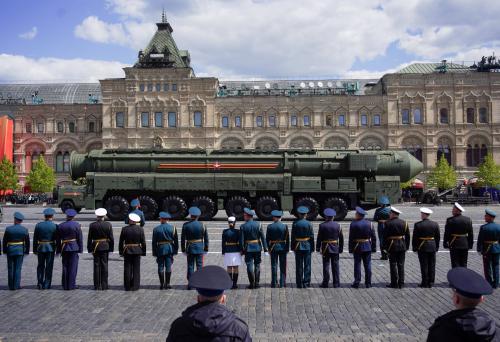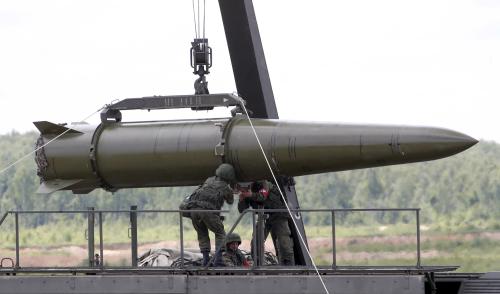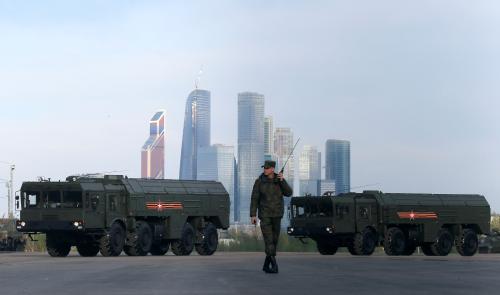Over the past several years, Vladimir Putin and senior Russian officials have talked loosely about nuclear weapons, suggesting the Kremlin might not fully comprehend the awful consequences of their use. That has caused a degree of worry in the West. Now, the West has in Donald Trump—the Republican nominee to become the next president of the United States—someone who also talks loosely about nuclear weapons and nuclear use. That’s not reassuring.
Putin and nukes
Mr. Putin likes to talk publicly every now and then about Russia’s nuclear weapons. Two years ago, he reminded a summer youth camp audience that Russia was a nuclear superpower—as if anyone needed reminding. With a nuclear arsenal believed to number some 4,500 weapons, Russia matches the size of the U.S. arsenal and has 15 times as many nuclear weapons as any third country. Kremlin propaganda outlets such as RT and Sputnik regularly post articles crowing about new Russian strategic weapons developments to make sure no one forgets.
Sometimes, Mr. Putin’s comments are more than a little odd. In a 2015 television documentary, he said he was prepared to put nuclear forces on alert as the Russian military seized Crimea. That was strange because Ukraine had no nuclear arms. It gave them up in the 1990s, in large part because Moscow promised to respect Ukraine’s independence and territorial integrity. Kiev even kept its Crimean-based troops in garrison, not challenging the invading Russian forces. As for the West, no country moved to intervene. So why would Mr. Putin think of a nuclear alert?
Last year, the Russian ambassador in Copenhagen threatened that Russia would target nuclear-armed missiles against Denmark. Ambassadors usually don’t say such things. Such talk apparently filtered down from the top.
This loose chatter about nuclear weapons becomes more worrisome against the backdrop of Russia’s “escalate to de-escalate” doctrine, which suggests a lower threshold for using nuclear arms in a conventional conflict. While much of Moscow’s strategic nuclear modernization program offers little reason for concern—the Russians are replacing old stuff with new stuff, just as the United States will be doing in the 2020s—Russia’s continued attachment to large numbers of tactical nuclear arms worries countries in its neighborhood.
In contrast, American leaders speak in a different way about nuclear weapons. Barack Obama usually refers to them in the context of cutting weapons numbers and reducing their role in U.S. security policy. He does not appear to see much need to remind the world that the United States has lots of nuclear bombs. It is difficult to believe that Mr. Obama would use nuclear weapons unless they were first used against the United States or an American ally. You could probably say that about every U.S. president since Dwight Eisenhower.
Then there is Mr. Trump
Mr. Trump appears to have a different view. On his August 3 MSNBC morning show, Joe Scarborough said: “Several months ago, a foreign policy expert on the international level went to advise Donald Trump. And three times [Trump] asked about the use of nuclear weapons. Three times he asked at one point, if we had them, why can’t we use them.”
Mr. Trump’s campaign promptly denied that he had said any such thing. That would be reassuring…except that Mr. Trump has publicly said something very similar. In a March town hall, MSNBC’s Chris Matthews observed that most people don’t want to hear about possible nuclear weapons use, especially from American presidents. Mr. Trump responded: “Then why are we making them? Why do we make them?”
U.S. nuclear weapons are in fact used—in a way—on a daily basis. Their existence serves as a deterrent against aggression. (One can debate how safe nuclear deterrence is, but that is another question.) If ever a nuclear weapon were used, however, the whole game would change, and a Pandora’s box would open, full of all kinds of bad, nasty, and unpredictable things. Responsible leaders understandably don’t want to go there.
In another March interview, Mr. Trump declined to exclude the option of using tactical nuclear arms against ISIS. Huh? What would he do? Incinerate an ISIS-occupied city in Syria or Iraq, killing thousands of innocent civilians, to get the ISIS fighters there?
Mr. Trump’s remarks make clear that he does not understand much about nuclear strategy. He also does not understand the weapons themselves. The foundation for U.S. nuclear deterrence is the strategic triad: submarine-launched ballistic missiles, silo-based intercontinental ballistic missiles, and long-range bombers. When the question came up at Republican debate last year, Mr. Trump’s confused answer suggested that he had no clue what the triad is.
The Kremlin might want to consider this
By all appearances, Mr. Trump is Moscow’s favored candidate in the November election. The Russian president speaks of Mr. Trump in very positive terms. Some analysts believe that Russian intelligence was behind the recent leak of DNC e-mails to Wikileaks. The Russia media has embraced Mr. Trump as its favorite for the White House in 2017. And why not? Mr. Trump speaks highly of Mr. Putin, wants to tear up America’s trade pacts, would weaken U.S. alliances, particularly NATO, and appears ready to recognize Russia’s illegal annexation of Crimea. If you’re sitting in the Kremlin, what’s not to like?
The Kremlin leadership, however, might consider this: Does it really want someone with Mr. Trump’s irresponsible attitude toward all things nuclear holding the U.S. launch codes?
And while it’s at it, the Kremlin leadership also might consider its own nuclear pronouncements.







Commentary
Hey, Kremlin: Americans can make loose talk about nukes, too
August 4, 2016